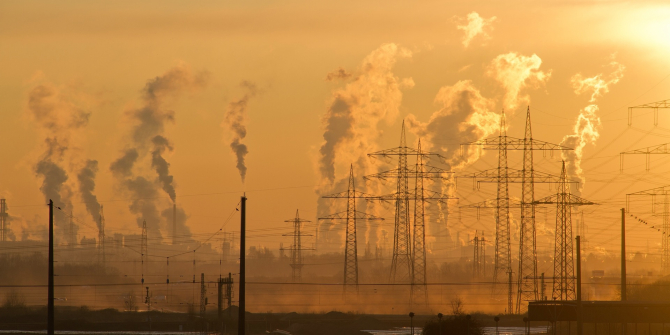The Russian war on Ukraine is providing the push for radical shifts in many countries’ energy mix, making green policies no longer a prerogative of young urban cosmopolitan elites. Alessio Terzi believes climate despair is understandable, but likely to be misplaced. The oil crisis in the 1970s is a good example of a world event that pushed countries to adopt low-carbon solutions, such as France’s embrace of nuclear energy and the Netherland’s unprecedented push towards bicycles.
The ancient Romans used to think that in the face of a pressing concern, all other problems should take the backseat: “ubi maior, minor cessat”. These days, the horrific war scenes originating from Ukraine have captured the West’s attention and led to an unprecedented wave of economic sanctions against Russia. The effort to cut ties with the aggressive oil and gas producer has gone as far as justifying a re-opening of old polluting coal-fired power plants, in contradiction with an agreement reached at the COP26 in Glasgow just a few months ago. Markets have taken notice, and the price of emitting carbon in Europe has tanked by roughly 40% in little more than a week, since an all-time high of roughly 100€ per ton. It would therefore seem at first sight that the energy crisis will lead inevitably to a delay in reaching climate neutrality, kicking global warming yet again into the long grass. Climate despair is understandable, and yet likely to be misplaced, if not myopic.
First, economists have long identified taxing carbon emissions as the key tool to address climate change. The fact that oil and gas prices have gone through the roof since the war started, and are widely expected to remain high, will work its way through the economy just as taxing carbon would have. In simple terms, it makes energy efficiency improvements way more pressing, for consumers and firms alike. Moreover, it tilts the balance in favour of investments in alternative energy sources, making them even more appealing with respect to the current fossil-based alternative. For instance, at current oil prices, each kilometre driven in an EV is 3-4 times cheaper than in an internal combustion engine car, providing an extra motivation to speed up their adoption. Similar considerations will apply to the installation of heat pumps for home heating, at a time when natural gas prices are at an all-time high in the UK, Europe, and Asia.
Once the war is over (eventually, one hopes) and energy prices normalise, these structural changes will have become entrenched. We know this is the case because it is not the first time it happens. During the Oil Crisis in the 1970s, when the price of the barrel trebled in a short period of time, radical long-lasting shifts in the economy and society ensued. In an effort to break its dependency on oil and OPEC’s blackmailing, France made an incredible push towards nuclear energy. As a result of this, half a century later, it is still one of the industrialised countries with the lowest GHG emissions per capita (roughly a third of the US in 2018). The Netherlands, being a small flat country, responded to the oil crisis with an unprecedented push towards bicycles: a feature for which the nation is world leader to this day. More broadly, in Europe and the US, smaller cars gathered foot, paving the way for the success of Japanese automobiles, which featured a smaller engine and higher fuel efficiency. It is not by chance that, to this day, the country is a top car exporter, and was among the pioneers of hybrid technology already in the early 2000s. Then, like now, critics were pointing out that these solutions would take time, hardly solving the problem of high energy prices in the short term. Then, like now, short-term drivers led to sizeable repercussions in the long term, evident to this day.
There is however a second, more political, reason why the energy crisis will accelerate the green transition. The current tense situation with Russia will instil a sense of immediate urgency into slashing fossil fuel consumption, while climate action notoriously suffers from the problem of generating payoffs only in the medium to long term. As noted by security expert Anatol Lieven in his 2020 book Climate Change and the Nation State, the fact that national security concerns and a switch to renewable energy become aligned can be a boon. Cutting through entrenched worldviews, the new reality implies that green policies are no longer a prerogative of young urban cosmopolitan elites. As a matter of fact, you do not even need to believe in climate science to be all for breaking away from Russian energy dependence, including by means of large investments in alternative energy sources. This is particularly important in countries where climate mitigation has become a highly polarising subject, like the US.
The fact that fossil fuel prices are skyrocketing abruptly and in an uncontrolled fashion creates the same incentive as carbon pricing to accelerate the green transition, but with the difference that it will lead to more disruptions in the short term. For instance, commentators are explicitly venting the possibility of some energy rationing come next winter. A drop in economic growth and bouts in inflation cannot be excluded, with negative repercussions on purchasing power, public finances, and social stability. More so than a managed green transition would have implied. Nonetheless, depending on their political views, citizens will see this either as a price worth paying to protect liberal democracy or something to be blamed on an aggressive imperialistic pariah state. But irrespectively, it will not call into question the need to accelerate the weaning of the economy off Russia, and therefore fossil fuels. Whether in war or peace, the future will inevitably be green.
♣♣♣
Notes:
- This blog post expresses the views of its author, which do not necessarily reflect those of the European Commission, LSE Business Review, or the London School of Economics and Political Science.
- Featured image by Ernest Ojeh on Unsplash
- When you leave a comment, you’re agreeing to our Comment Policy.





